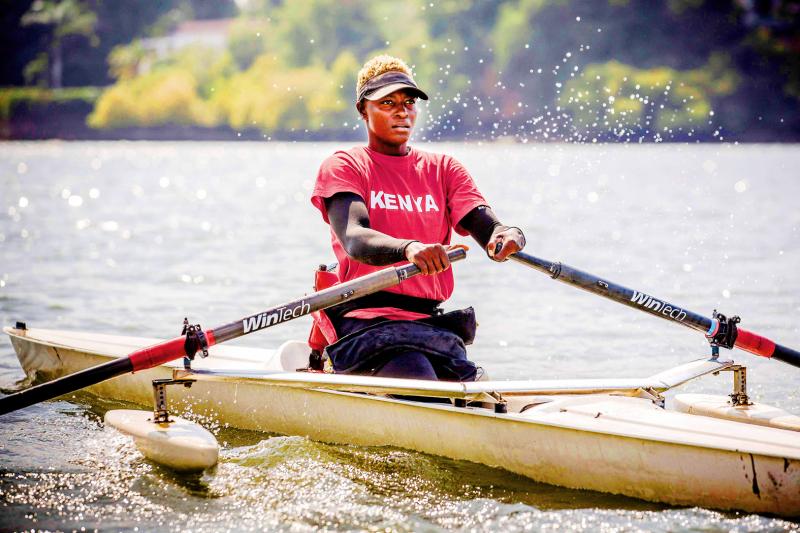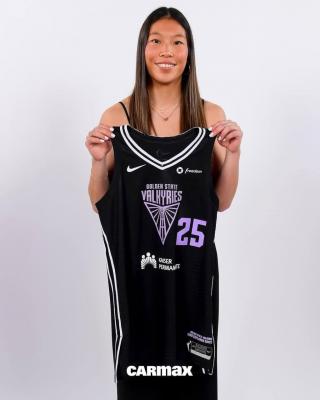When she was just two years old, Asiya Mohammed was hit by a train as she crossed railway tracks near her Kenyan home, an accident that claimed both her legs and several fingers.
Seven years later she was orphaned.
Rather than crumpling in the face of such adversity, Mohammed has gone on to become a highly decorated para-athlete and is the first Kenyan female rower to qualify for the Paralympic Games opening in Tokyo later this month.

Photo: AFP
Yet the bubbly 29-year-old, who was brought up by a cousin and first trained as a teacher, said she did not value sports until weight gain changed her outlook on life about five years ago.
“As a disabled person, I was weighing 70kg, which caused a lot of concern to my immediate family. They advised me to join sports to help me cut the weight and remain in shape,” she said.
The sports available at the time in her home city of Mombasa on Kenya’s east coast were wheelchair tennis, badminton and rowing.
Mohammed went on to win medals in competitions in all three sports as well as wheelchair marathons.
Eventually the double amputee decided to focus on rowing and would be competing in the PR1 single sculls in Tokyo.
“I realized I was getting more captivated by rowing because of the friendly atmosphere, and I made up my mind that I was going to do this sport until I qualified for the Olympics,” she said.
“I made an immediate decision to abandon teaching completely and go full bodied into sport full time, especially in the rowing,” she added.
In May 2019, she qualified to compete in her first-ever international event — the season-opening para-rowing Gavirate Regatta in Italy.
“She finished second last in her competition, but her passion and keen interest for rowing impressed the international team of coaches attending the regatta who remarked that it wouldn’t take long before Asiya qualified for the World Championships and the Paralympics,” said Joshua Kendagor, a Kenya Navy officer who coaches Asiya and is to accompany her to the Paralympics.
She eventually booked her berth for Tokyo at the African pre-Paralympic championships in Tunis in October 2019, where she beat out seven other contenders to win the PR1 women’s singles sculls, for competitors using their arms only.
It has not been smooth sailing for Mohammed, who has had to overcome many frustrations as a physically disabled woman in sport — including a lack of funding and support from Kenyan federations.
She had to borrow proper rowing gear from her able-bodied male compatriots to compete in Tunis, after her request to the Kenya Rowing Federation to provide her with the competition kit failed to materialize.
“I was so heartbroken and frustrated when the Kenya Rowing Federation and the Kenya National Paralympic Committee both told me they would not be sponsoring any rowers for the pre-Olympics qualifier due to lack of funds, and yet my male colleagues had received full funding from the National Olympic Committee of Kenya,” she said.
Her family and friends were also forced to raise the money for her airfare to Tunisia — but she repaid them by being the only Kenyan rower at the event to qualify for the Para games.
“After the championships, I was gifted with two rowing boats by the International Rowing Federation — one for training and the other for the competition at the Paralympics — but until today I have not received the two boats,” she said.
The Kenyan said she is determined to put the problems behind her.
“I don’t want to finish last. I am very realistic,” Mohammed said, adding that she wants to advance to the final six in the PR1 women’s single sculls to be in medal contention.
“I am in rowing until I win an Olympic medal,” she said.

College basketballer Kaitlyn Chen has become the first female player of Taiwanese descent to be drafted by a WNBA team, after the Golden State Valkyries selected her in the third and final round of the league’s draft on Monday. Chen, a point guard who played her first three seasons in college for Princeton University, transferred to the University of Connecticut (UConn) for her final season, which culminated in a national championship earlier this month. While at Princeton, Chen was named the Ivy League tournament’s most outstanding player three times from 2022 to last year. Prior to the draft, ESPN described Chen as

College basketballer Kaitlyn Chen (陳凱玲) has become the first player of Taiwanese descent to be drafted by a WNBA team, after being selected by the Golden State Valkyries in the third and final round of the league's draft yesterday. Chen, a point guard who played her first three seasons in college for Princeton University, transferred to the University of Connecticut (UConn) for her final season, which culminated in a national championship on April 6. While at Princeton, Chen was named the Ivy League tournament's most outstanding player three times from 2022 to last year. Prior to the draft, ESPN described Chen as a

Japan yesterday secured a second consecutive Billie Jean King Cup finals appearance with a 2-1 win over 2023 champions Canada, thanks to Ena Shibahara and Shuko Aoyama’s 6-3, 5-7, 6-2 win over Kayla Cross and Rebecca Marino in the qualifying doubles decider. Shibahara and Aoyama powered through the opening set 6-3, breaking twice for a quick 3-0 lead. Cross and Marino hit back in the second, edging it 7-5 to level the match, before the Japanese pair regained control in the third. Canada’s 18-year-old Victoria Mboko edged Shibahara 6-4, 6-7 (8/10), 7-5 in a marathon opening clash. Mboko fired eight aces to

DAY OF BLOWOUTS: Elsewhere, the Lakers clinched the third seed in the Western Conference with a 140-109 pounding of the under-strength Houston Rockets The Denver Nuggets on Friday improved their playoff position, with a triple double from Nikola Jokic helping them to a 117-109 win over the Memphis Grizzlies. The Serbian put up 26 points, 13 assists and 16 rebounds. The triple-double performance, his 34th this season, ensured that he will finish the regular season as just the third NBA player to average a triple double across an entire season. The win meant the Nuggets improved to 49-32 on the season and gave them a real chance of grabbing fourth place and home-court advantage in the playoffs. Aaron Gordon top scored with 33 points for Denver,